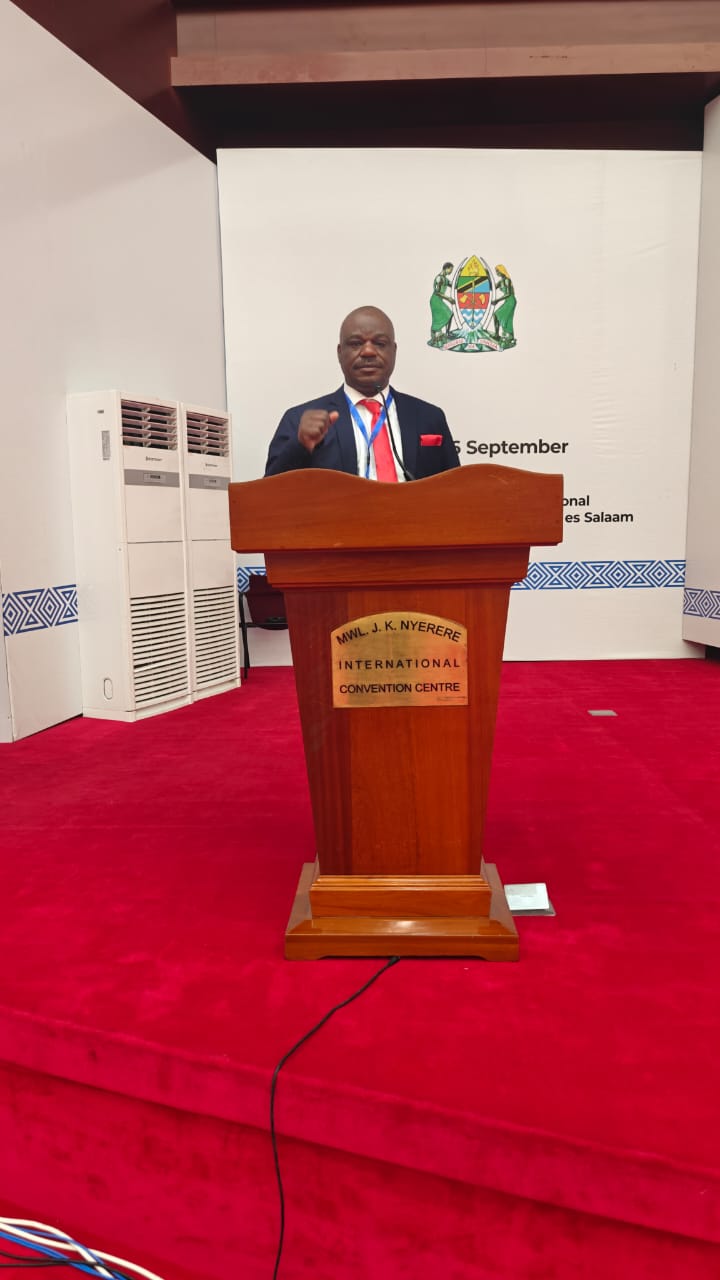Business
Zimbabwe Showcases Teacher Motivation Strategies at International Quality Education Conference

Staff Reporter
Zimbabwe Foundation for Education with Production (ZIMFEP) National Director, Mr Gideon Chiukira, has applauded the Government of Zimbabwe for its deliberate and comprehensive measures to motivate teachers and improve the quality of education, despite the country enduring over two decades of illegal economic sanctions.
Speaking during a panel discussion at the ongoing 5th International Quality Education Conference (IQEC) in Dar es Salaam, Mr Chiukira outlined several innovative policies that have positioned Zimbabwean teachers at par with their regional counterparts.
He said the Government of His Excellency President Dr Emmerson Dambudzo Mnangagwa had made teacher welfare a key priority, recognising that quality education can only be achieved when educators are well supported and motivated.

Among the incentives, Mr Chiukira highlighted the duty-free facility that allows teachers to import vehicles without paying customs duty. This, he said, has enabled many teachers to acquire reliable transport, a benefit that not only uplifts their standard of living but also enhances their mobility and effectiveness in service delivery.
He further revealed that when new residential land is developed across the country, 10 percent is reserved for civil servants, including teachers, ensuring that educators have access to affordable home ownership opportunities.
“This policy guarantees that teachers are not left behind in the national housing agenda,” Mr Chiukira said, adding that it is a practical way of securing their future and promoting loyalty to the profession.
In addition, Mr Chiukira noted that most teachers in Zimbabwe enjoy free accommodation at their stations, with electricity and water provided at no cost. This, he stressed, significantly reduces the cost of living and allows teachers to focus on delivering quality lessons without the burden of basic utility bills.
Highlighting ZIMFEP’s own initiatives, Mr Chiukira explained that some of its schools go a step further by providing teachers with free breakfast, lunch and supper, as well as monetary incentives on top of their government salaries.
“These benefits ensure that our educators are motivated and well nourished, creating a conducive environment for both teaching and learning,” he said.
Mr Chiukira also drew attention to the Teachers4ED initiative, a platform that assists teachers to form companies capable of bidding for and winning tenders.
He said Teachers4ED has a sub-cluster known as the Zimbabwe Economic Development Initiative, which helps teachers and other civil servants to acquire and service residential stands.
Teachers are also benefitting from loan facilities provided by local financial institutions such as the Women’s Bank in Zimbabwe and other banks, enabling them to invest in businesses and improve their livelihoods.
Commending the Government’s commitment, Mr Chiukira praised His Excellency President Dr Emmerson Dambudzo Mnangagwa for prioritising teacher welfare under challenging economic conditions.

“Despite the illegal sanctions imposed on our country for over 20 years, our Government has ensured that Zimbabwean teachers remain competitive with their counterparts in the region,” he said.
The 5th IQEC has attracted education experts, policymakers and stakeholders from across Africa and beyond, all sharing best practices to enhance the delivery of quality education. Zimbabwe’s example of comprehensive teacher support drew keen interest from delegates, with Mr Chiukira urging other nations to invest in their educators as a cornerstone for sustainable educational development.
Business
MIF raises USD 1 billion in first year

Eyes USD 10 billion recapitalisation drive
Itai Mazire
The Mutapa Investment Fund (MIF) has raised about USD 1 billion in capital to support the recapitalisation, modernisation and restructuring of State-owned enterprises, marking a significant milestone in efforts to stabilise and revive some of Zimbabwe’s most strategic economic assets.
The Fund, in its inaugural annual report and first set of audited financial statements, said the capital mobilisation achieved through a mix of debt, equity and partnership arrangements represents a critical step towards addressing long-standing infrastructure deficits, modernising operations and restoring viability across its investment portfolio, whose total funding requirements exceed USD 10 billion.
The USD 1 billion already raised has been channelled towards priority interventions across the Fund’s clusters, including infrastructure refurbishment, capital expansion and recapitalisation initiatives aimed at restoring operational efficiency and improving service delivery.
MIF says the successful mobilisation of this initial funding demonstrates its growing capacity to leverage its balance sheet and attract diverse sources of capital.
“The Fund maintains a cluster-wide funding pipeline prioritising infrastructure refurbishment, capital expansion and recapitalisation initiatives,” reads the report.
“Total funding requirements exceed USD 10 billion, with approximately USD 1 billion raised to date for portfolio companies.”
According to the report, MIF is pursuing a multi-pronged funding strategy that combines debt and equity financing, public-private partnerships (PPPs) and joint ventures with development finance institutions, commercial banks and private investors.
Under this approach, the Fund structures transactions that allow private capital to co-invest alongside the State in specific projects or entities, while spreading risk and improving access to long-term financing.
In some cases, PPPs are being used to unlock private sector expertise and funding for infrastructure upgrades, while joint ventures enable strategic investors to inject capital and technical know-how into portfolio companies.
Beyond capital mobilisation, MIF has placed strong emphasis on strengthening corporate governance across its portfolio, which it says is critical to restoring investor confidence and ensuring sustainable performance.
The Fund has rolled out a governance roadmap anchored on diagnostic assessments, board induction and training, development of environmental, social and governance (ESG) frameworks, and the strengthening of internal and external audit processes.
“MIF places strong emphasis on good corporate governance, compliance and capacity building.
“The governance roadmap includes diagnostic assessments, board training, ESG framework development, internal and external audits, and alignment with international best practices.
“The Fund focuses on compliance with regulatory requirements, managing legal risks, and supporting effective governance through standardised reporting and training.
“Key governance targets include achieving 90 percent compliance with the Santiago Principles, 100 percent board member induction, and continuous professional development.”
Standardised reporting frameworks and compliance systems are also being enforced to manage legal risks and align portfolio companies with international best practice.
On performance, the Fund reports progress in stabilising and restructuring several investee companies, although it acknowledges that significant challenges remain.
These include legacy debts, historical governance weaknesses at some entities, and persistent liquidity constraints that limit the pace of recovery.
Looking ahead, MIF says its strategic focus is shifting from planning to execution, with increased emphasis on tighter portfolio monitoring, stricter enforcement of governance reforms and targeted capital deployment to unlock value.
The Fund believes these measures will strengthen the contribution of its portfolio to economic growth, fiscal stability and long-term national development.
Chief executive officer Dr John Mangudya said MIF spent its first year undertaking diagnostic assessments and portfolio valuations to inform turnaround and growth strategies.
He said the Fund had a gross asset value of USD 16 billion and a fair value of USD 15 billion as at December 31, 2024.
“Our investment strategy prioritises resilience, diversification and sustainable value creation.
“Inspired and empowered by the country’s vision of becoming a prosperous upper-middle-income economy by 2030, we strengthened and continued to enhance governance frameworks across our portfolio companies, enhanced risk management practices, and deepened our focus on operational efficiency during 2024,” said Dr Mangudya.
Business
Zimbabwe to Maintain Mineral Buying Programme in 2026 – RBZ Governor

Zimbabwe will sustain its programme of strategic mineral purchases in 2026 as part of broader efforts to build foreign currency reserves and support the long-term transition to the ZiG as the country’s sole legal tender by 2030.
Reserve Bank of Zimbabwe (RBZ) Governor John Mushayavanhu confirmed the policy direction in an opinion piece published in the state-run Sunday Mail, saying reserve accumulation remains central to monetary stability.
Mushayavanhu noted that the central bank intends to strengthen and sustain the ongoing buildup of foreign currency reserves, with a target of achieving cover equivalent to three to six months of imports. He said this level of reserves is essential for a smooth shift to a mono-currency system.
According to the RBZ governor, the strategy will be underpinned by firm enforcement of export surrender requirements, continued strategic mineral purchases, and a resilient external sector.
He added that stronger reserves would help stabilise the ZiG and improve the country’s ability to withstand external economic shocks.
Mushayavanhu revealed that Zimbabwe’s foreign currency reserves comprising gold, other precious minerals, foreign deposits, and cash holdings rose significantly from US$276 million in April to about US$1.1 billion by December. This represents roughly 1.2 months of import cover.
Zimbabwe has spent close to two decades trying to restore a stable national currency after successive failures that culminated in hyperinflation and the adoption of the US dollar in 2009. The ZiG, introduced in April 2024, is the latest attempt and currently accounts for about 40 percent of daily transactions.
The RBZ governor said reserve accumulation has been driven by mandatory mining royalties, direct gold purchases, and favourable global prices for gold and platinum.
Under existing regulations, mining and exporting companies retain 70 percent of their foreign currency earnings, with the balance converted to local currency. Since October 2022, mining firms have also been required to pay half of their royalties in physical minerals, with the remaining portion settled in cash to the central bank.
Authorities believe the continuation of mineral purchases will play a key role in anchoring the ZiG, boosting confidence in the currency, and protecting the economy from external volatility as Zimbabwe works toward full currency normalisation.
Business
Ease-of-Doing-Business Reforms Spur Local Investment in Masvingo

Government ease-of-doing-business reforms under the Second Republic continue to attract local investment and create employment, with Masvingo Province recording increased participation by indigenous entrepreneurs.
One such investment is a service station and retail complex in Rujeko suburb, established in 2025 by local businessman Against Chiteme. The project was commissioned on Monday and has created more than 30 jobs, while improving access to fuel and retail services for the surrounding community.
Mr Chiteme said the enabling business environment introduced by Government gave him the confidence to expand beyond small-scale ventures.
“The ease-of-doing-business measures encouraged us to invest and grow. This project is meant to serve the Rujeko community and we are looking to expand further,” he said.
Masvingo Minister of State for Provincial Affairs and Devolution, Hon Ezra Chadzamira, said the reforms were aimed at cutting costs, simplifying licensing processes and reducing red tape, particularly in key sectors such as retail and transport.
He added that the province had recorded increased local investment across sectors including manufacturing, agriculture, mining and tourism.
Political and religious leaders who attended the commissioning ceremony urged citizens to seize available opportunities, saying community-based investments were improving livelihoods and access to essential services.
-

 Current Affairs2 months ago
Current Affairs2 months agoOperation restore order
-

 Crime and Courts3 months ago
Crime and Courts3 months agoMasasi High School Abuse Scandal Sparks Public Outcry
-

 Crime and Courts4 months ago
Crime and Courts4 months agoKuwadzana Man Jailed for Reckless Driving and Driving Without a Licence
-

 Current Affairs5 months ago
Current Affairs5 months agoBreaking: ZIMSEC June 2025 Exam Results Now Available Online
-

 Current Affairs4 months ago
Current Affairs4 months agoMunhumutapa Day: Zimbabwe’s Newest Public Holiday Set for Annual Observance
-

 Current Affairs3 months ago
Current Affairs3 months agoBREAKING NEWS: ZANU PF Director General Ezekiel Zabanyana Fired
-

 Current Affairs5 months ago
Current Affairs5 months agoNo Racism in Our Cricket: Government
-

 Current Affairs4 months ago
Current Affairs4 months agoGovernment Bans Tinted Car Windows in Nationwide Crime Crackdown




Abigail Mazingaizo
September 27, 2025 at 6:28 am
This idea of teacher getting free Accomodition is very amazing and this free duty for them